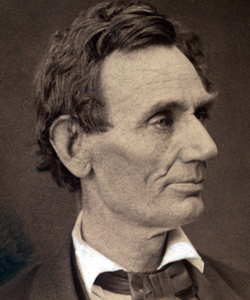 After the Republican National Convention selected Abraham Lincoln in May 1860 as their candidate for the 1860 election, some Republican newspaper editors noted that Lincoln was a moderate politician. Lincoln opposed the further extension of slave territory, but he did not call for the end of slavery in the South. Yet some southern editors were quick to characterize him as a dangerous radical who would destroy slavery and the Union. The Fayetteville (NC) Observer, which supported the Constitutional Union party, called Lincoln an “ultra abolitionist.” Republicans “[had]… selected [him] to split the Union,” as the Democratic Charleston (SC) Courier explained. Other editors focused on the threat from the Republican party’s “objects” rather than a specific candidate. The (Jackson) Mississippian, a Democratic paper, observed that the “Black Republican’s” overall objective “[was] to degrade the southern States from their positions of equality in the Union and to destroy their social and political institutions.” One might assume that these editors would support secession after Lincoln’s victory. While that was true for the Charleston (SC) Courier and the The (Jackson) Mississippian, the Fayetteville (NC) Observer supported unionists until President Lincoln called for volunteers after Confederates attacked Fort Sumter in April 1861.
After the Republican National Convention selected Abraham Lincoln in May 1860 as their candidate for the 1860 election, some Republican newspaper editors noted that Lincoln was a moderate politician. Lincoln opposed the further extension of slave territory, but he did not call for the end of slavery in the South. Yet some southern editors were quick to characterize him as a dangerous radical who would destroy slavery and the Union. The Fayetteville (NC) Observer, which supported the Constitutional Union party, called Lincoln an “ultra abolitionist.” Republicans “[had]… selected [him] to split the Union,” as the Democratic Charleston (SC) Courier explained. Other editors focused on the threat from the Republican party’s “objects” rather than a specific candidate. The (Jackson) Mississippian, a Democratic paper, observed that the “Black Republican’s” overall objective “[was] to degrade the southern States from their positions of equality in the Union and to destroy their social and political institutions.” One might assume that these editors would support secession after Lincoln’s victory. While that was true for the Charleston (SC) Courier and the The (Jackson) Mississippian, the Fayetteville (NC) Observer supported unionists until President Lincoln called for volunteers after Confederates attacked Fort Sumter in April 1861.
21
Jul
10








Related Articles
No user responded in this post
Leave A Reply
Please Note: Comment moderation maybe active so there is no need to resubmit your comments